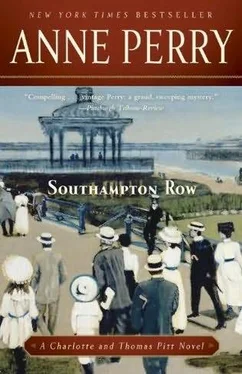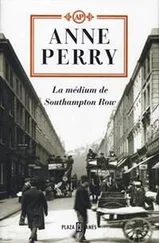Anne Perry - Southampton Row
Здесь есть возможность читать онлайн «Anne Perry - Southampton Row» весь текст электронной книги совершенно бесплатно (целиком полную версию без сокращений). В некоторых случаях можно слушать аудио, скачать через торрент в формате fb2 и присутствует краткое содержание. Жанр: Исторический детектив, на английском языке. Описание произведения, (предисловие) а так же отзывы посетителей доступны на портале библиотеки ЛибКат.
- Название:Southampton Row
- Автор:
- Жанр:
- Год:неизвестен
- ISBN:нет данных
- Рейтинг книги:5 / 5. Голосов: 1
-
Избранное:Добавить в избранное
- Отзывы:
-
Ваша оценка:
- 100
- 1
- 2
- 3
- 4
- 5
Southampton Row: краткое содержание, описание и аннотация
Предлагаем к чтению аннотацию, описание, краткое содержание или предисловие (зависит от того, что написал сам автор книги «Southampton Row»). Если вы не нашли необходимую информацию о книге — напишите в комментариях, мы постараемся отыскать её.
Southampton Row — читать онлайн бесплатно полную книгу (весь текст) целиком
Ниже представлен текст книги, разбитый по страницам. Система сохранения места последней прочитанной страницы, позволяет с удобством читать онлайн бесплатно книгу «Southampton Row», без необходимости каждый раз заново искать на чём Вы остановились. Поставьте закладку, и сможете в любой момент перейти на страницу, на которой закончили чтение.
Интервал:
Закладка:
She said nothing for a few moments, riding in silence, thinking over Rose’s sudden, strange questions about seances and the tension within her. She was uncertain whether to worry Jack with it or not, but it hung heavily with her, an unease she could not dismiss.
The carriage turned a corner sharply into a quieter street where the lamps were farther apart, shining up with ghostly gleam into the branches above.
“Rose was talking about spiritualists,” she said abruptly. “I think you should suggest that Aubrey tell her to be discreet about that, too. It could be misinterpreted by enemies, and once the election is called in earnest there’ll be plenty of those. I. . I think perhaps Aubrey isn’t used to being attacked. He’s such a charming man almost everyone likes him.”
He was startled. He jerked around in the carriage seat to face her.
“Spiritualists? You mean mediums like Maude Lamont?” There was an edge of anxiety in his voice sharp enough that she did not need to see his expression to know what it would be.
“She didn’t mention Maude Lamont, although everybody’s talking about her. Actually, she talked about Daniel Dunglass Home, but I suppose it’s much the same. She spoke of levitation and ectoplasm and things.”
“I never know whether Rose is joking or not. . was she?” It was not a question but a demand.
“I’m not sure,” she admitted. “But I don’t think so. I had the feeling that under the surface she cared very much about something.”
He shifted uncomfortably, only half because of the carriage’s rattling over uneven cobbles. “I’ll have to speak to Aubrey about that, too. What is a social game when you are a private person becomes the rope for journalists to hang you with when you stand for Parliament. I can see the cartoons now!” He winced so acutely that she saw the movement in his cheek in the pool of light as they passed under a street lamp and back into darkness again. “Ask Mrs. Serracold who’s going to win the election! Damn it, better than that. . who’s going to win the Derby!” he said in a mimicking voice. “Let’s ask Napoleon’s ghost what the Czar of Russia’s going to do next. He can’t ever have forgiven him for Moscow and 1812.”
“Even if he knew, he wouldn’t be likely to tell us,” she pointed out. “He is even less likely to have forgiven us for Waterloo.”
“If we couldn’t ask anyone with whom we’ve ever had a war, that would rule out just about everybody on earth, except the Portuguese and the Norwegians,” he retorted. “Their knowledge about our future might be rather limited; they probably don’t give a farthing.” He took a deep breath and let it out in a sigh. “Emily, do you think she’s really seeing a medium, other than just for fun at a house party?”
“Yes. .” Emily spoke with a chill conviction. “Yes. . I’m afraid I do.”
The following morning brought news of a different and disturbing kind. Pitt was looking through the newspapers over breakfast of poached kippers and bread and butter-one of the few things he was quite good at cooking-when he came across the letter to the editor. It was the first one on the page, and given particular prominence.
Dear Sir,
I write in some distress, and as a lifelong supporter of the Liberal Party and all that it has achieved for the people of this nation, and thus indirectly of the world. I have admired and endorsed the reforms it has initiated and passed into law.
However, I live in the constituency of South Lambeth, and have listened with growing alarm to the opinions of Mr. Aubrey Serracold, the Liberal candidate for that seat. He does not represent the old Liberal values of sane and enlightened reform, but rather a hysterical socialism which would sweep away all the great achievements of the past in a frenzy of ill-thought-out changes, possibly well-meaning, but inevitably benefiting the few, for a short while, at the expense of the many, and to the eventual destruction of our economy.
I urge all others who normally support the Liberal Party to pay the closest attention to what Mr. Serracold has to say, and consider, albeit with regret, whether they can indeed support him, and if they do, what path of ruin they may be setting us upon.
Social reform is the ideal of every honest man, but it must be done with wisdom and knowledge, and at the pace at which we can absorb it into the fabric of our society. If it is done hastily, to answer the emotional self-indulgence of a man who has no experience and, it would seem, little practical sense, then it will be to the cost and the misery of the vast majority of our people, who deserve better of us.
I write with the greatest sadness,
Roland Kingsley, Major General, retired
Pitt let his tea go cold, staring at the printed sheet in front of him. This was the first open blow against Serracold, and it was hard and deep. It would damage him.
Was this the Inner Circle mobilizing, the beginning of the real battle?
CHAPTER THREE
Pitt went out and bought five other newspapers and took them home to see if Major General Kingsley had written to any more of them in similar vein. Almost the same letter was in three of them; there was only a variation of phrase here and there.
Pitt folded the papers closed and sat still for several minutes wondering what weight to attach to it. Who was Kingsley? Was he a man whose opinion would influence others? More importantly than that, was his writing coincidence or the beginning of a campaign?
He had reached no conclusion as to whether there was a necessity for learning more about Kingsley, when the doorbell rang. He glanced up at the kitchen clock and realized it was after nine. Mrs. Brody must have forgotten her keys. He stood up, resentful of the intrusion although he was grateful enough for her work, and went to answer the increasingly insistent jangle of the bell.
But it was not Mrs. Brody on the step, it was a young man in a brown suit, his hair slicked back and his face eager.
“Good morning, sir,” he said crisply, standing to attention. “Sergeant Grenville, sir. .”
“If Narraway wants to tell me about the letter in the Times , I’ve read it,” Pitt said rather sharply. “And in the Spectator , the Mail and the Illustrated London News .”
“No, sir,” the man replied with a frown. “It’s about the murder.”
“What?” Pitt thought at first that he had misheard.
“The murder, sir,” the man repeated. “In Southampton Row.”
Pitt felt a stab of regret so sharp it was almost a physical pain, then a surge of hatred for Voisey and all the Inner Circle for driving him from Bow Street, where he had dealt with crimes he understood, however terrible, and for which he had the skill and the experience in almost all cases to find some resolution. It was his profession, and he was good at it. In Special Branch he was floundering, knowing what was coming and powerless to prevent it.
“You’ve made a mistake,” he said flatly. “I don’t deal with murders anymore. Go back and tell your commander that I can’t help. Report to Superintendent Wetron at Bow Street.”
The sergeant did not move. “Sorry sir, I didn’t say it properly. It’s Mr. Narraway as wants you to take over. They won’t like it at Bow Street, but they just got to put up with it. Mr. Tellman’s in charge in Southampton Row. Just made up recent, like. But I expect you know that, seeing as you was used to working with ’im all the time. Begging your pardon, sir, but it would be a good thing if you went there right away, seein’ as they discovered the body about seven, an’ it’s coming up ’alf past nine now. We just got to ’ear of it, and Mr. Narraway sent me right over.”
Читать дальшеИнтервал:
Закладка:
Похожие книги на «Southampton Row»
Представляем Вашему вниманию похожие книги на «Southampton Row» списком для выбора. Мы отобрали схожую по названию и смыслу литературу в надежде предоставить читателям больше вариантов отыскать новые, интересные, ещё непрочитанные произведения.
Обсуждение, отзывы о книге «Southampton Row» и просто собственные мнения читателей. Оставьте ваши комментарии, напишите, что Вы думаете о произведении, его смысле или главных героях. Укажите что конкретно понравилось, а что нет, и почему Вы так считаете.












